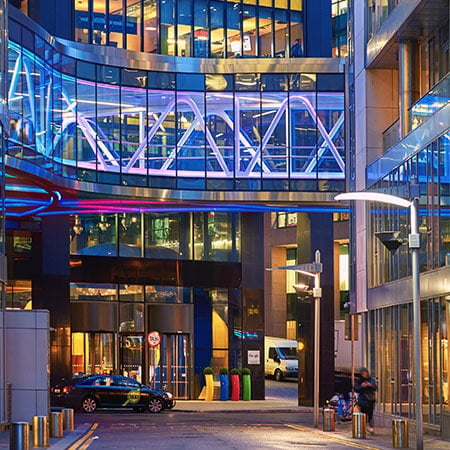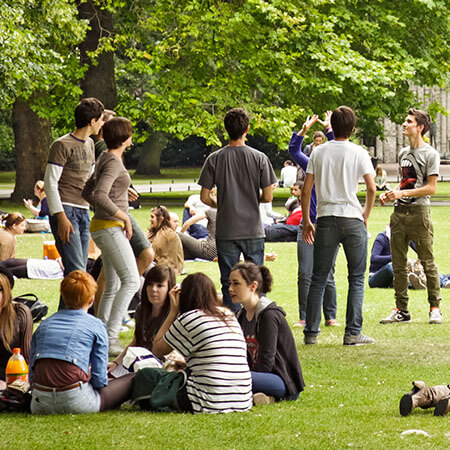Dublin is a global, entrepreneurial city with a bright future – and many people have moved here to share in its success. Here are seven of the top reasons why working in Dublin might be the right move for you too.
1. The robust jobs market
Ireland’s GDP growth was expected to decline be 0.9% in 2023 after a stellar performance in recent times as economic activity continues to normalise. Growth is projected to be solid in the coming years though as GDP is forecast to rise by 2.2% in 2024 and 3.8% in 2025.
Unemployment rates are projected to remain low in 2024 by historical standards with the jobs market still most certainly on the up.
In fact, according to EY’s Economic Eye, given the tight labour market and some compensation for past inflation, wage increases are also anticipated in 2024. This is good news for salaries too.
To get a clear idea of what the most sought-after skills in Ireland are right now, you can check the Government’s list of occupations that are considered critical and allow skilled immigrants to take work in Ireland under preferential terms.
2. The world-leading business culture
Dublin is a business-friendly city that has prioritised competitiveness for several decades. So, no matter what field you’re in, your career will benefit from living and working in Dublin.
Dublin’s prosperity owes much to its embrace of the knowledge economy. The city’s leaders recognised its potential early on and set about building a city that attracts international businesses and the talent it relies on.
As long ago as the 1980s, city authorities set about redeveloping Dublin’s historic docklands. This iconic area is now home to the city’s thriving financial and tech industries. Here, you’ll find the offices of many world-renowned multinationals. Over 500 companies operate in this area, including more than half of the world’s top 50 banks, as well as technology leaders like Google, Facebook, Twitter and Accenture.
This city’s commitment to both business and talent hasn’t waned and it continues to perform well in rankings of culture and competitiveness. This means it is still an attractive location for leading business, as well as a great place to develop your career.

3. The craic is 90
Work culture aside, living in Dublin means that there’s loads to do in your downtime. Every weekend you’ll find a different festival, concert or market happening nearby. The vibrant shopping, nightlife and food scenes also means you’ll never be stuck for something to do.
With 40% of the city’s population aged under 30, Dublin’s nightlife is generally buzzing too. The music scene is pumping and venues like Croke Park are regularly packed out with fans of international stars. That’s when it isn’t hosting Gaelic games – Ireland’s favourite sports. Rugby and football also bring the fans out in huge numbers.
4. Educational and research opportunities
Ireland’s third-level education system is among Europe’s best. Despite its relatively small population, Ireland boasts seven public universities and fourteen institutes of technology. Many of them bring learning opportunities to the city’s workplaces too.
Government agencies in charge of attracting foreign direct investment have created networks which nurture collaboration between research institutions and private enterprises. And they seem to be working. Ireland ranks fifth in the EU for R&D investment, which means our companies are always at the cutting edge.
R&D investments are made across a broad range of industries, such as ICT, nanotechnologies, manufacturing and processing, biotechnology and space. So if you’re in one of these areas and wondering why to work in Dublin, know that your career may benefit from the opportunity to witness or take part in ground-breaking research.
5. The multilingual culture
Over a relatively short time, Dublin has become an extraordinarily diverse city. People come from all over the globe to live and work here. And you can be sure that citizens from your own country are amongst them – wherever you’re from. Finding like-minded people to socialise with is made easier again by the welcoming nature of local Dubliners.
English is the most widely spoken language in Ireland. But around half a million residents speak a second language. Polish, French, Lithuanian, German, Spanish, Russian and Romanian are particularly common. While around 39% can speak Irish.
Immigration from countries outside the EU is also on the rise, so languages like Chinese, Portuguese and Arabic are gaining prominence in the city too.
6. Plenty of holidays
Full-time workers in Ireland are entitled to four weeks’ leave each year. This is on top of any time they take off for public holidays, sick leave or maternity/paternity leave.
Ireland is small, so a weekend away in a beautiful spot like Galway, Dingle or Waterford is eminently doable during bank holiday weekends. Alternatively, you could take a week or two off to travel home or explore other parts of the world.

7. Exploring Europe or visiting the USA
Looking at a map, it can seem like Ireland is on the edge of the world. While that may have been true in the past, air travel has connected our island nation with the rest of the world.
We’re on Europe’s doorstep and a nearby airport makes travelling to and from Dublin convenient. Europe’s glittering capitals, Mediterranean resorts and ski chalets are just a few hours away. Best of all, Ireland’s low-cost airlines will get you there for an affordable price.
Ireland is relatively close to the USA too. So you can fly to New York in just under seven hours. Plus Dublin Airport offers US pre-clearance facilities, which are the only ones of their kind in Europe. This makes travelling between Dublin and the USA more straightforward and less stressful. There’s no better base from which to explore.
Check out the articles below for more information on why you should consider working in Dublin.



